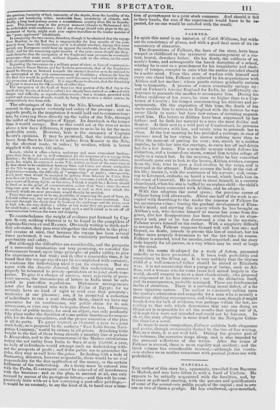FA I. IL NE R.
IN spirit this novel is an imitation of Caleb Williams, but with- out its consistency of gloom, and with a good deal more of its in- consistency of character.
The dispositions of Falkner, the hero of the story, have been
warped in childhood by the tyrranical mismanagement of a via lent, brutal, drunken father. On his death, the coldness of an uncle's, home, and subsequently the harsh discipline of a school, whither he is sent as a punishment for his irregularity and obsti- nacy of temper, conspire to ruin what the author intended should be a noble mind. From this state of warfare with himself and every one about him, Falkner is relieved by his acquaintance with Malice and her mother ; whose gentle virtues gradually reclaim him to humanity. A passion of course eventually springs up ; and on Falkner's leaving England for India, he ineffectually en- deavours to persuade the maiden to accompany him. During his Indian residence of ten years, he rises no higher than to a Cap- taincy of Cavalry ; his temper counteracting his abilities and ac- quirements. On the expiration of this time, the death of his uncle enables him to return to England with the fortune he was never likely to earn; but here new causes of irritating anguish await him. His letters to Alithea have been suppressed by her father ; and he finds her married to a man she must dislike and despise. At their seat in a wild part of Cumberland, he procures several interviews with her, and vainly tries to persuade her to elope. At the last meeting he has provided a carriage, in case of success: awed by her virtue, he means nothing more than to delay the moment of parting for ever ; but, struck by a sudden impulse, he lifts her into the carriage, to carry her off and detain her for a few hours. The sfasmodic syncope which follows his abduction, and a tremendous storm, compel him to take refuge all night in a ruined hut. In the morning, whilst he has somewhat needlessly gone out to look to the horses, Alithea awakes, escapes from the hut, tries to pass a ford swollen by the rains, and is drowned in the attempt. Falkner rescues the body at the risk of his life ; buries it, with the assistance of his servant ; and, escap- ing to Liverpool, embarks on board a vessel, which lands him on the coast of Cornwall. He is about to shoot himself, in a country churchyard, when his aim is baffled by an orphan child : the child's mother had been connected with Alithea, and he adopts it.
With this adoption the novel opens; the previous career of Falkner being told afterwards. About one half of the work is oc- cupied with describing to the reader the remorse of Falkner for his mysterious crime; tracing the gradual development of Eliza- beth's mind; and showing the misery which he has brought on Alithea's son, who devotes himself to rescue her name from dis- grace, (for her disappearance has been attributed to an elope- ment,) and, just as he has discovered a clue to the mystery, Falkner avows himself as the author. With a simplicity difficult to account for, Falkner supposes Gerard will call him out ; and Gerard, no doubt, intends to pursue this line of conduct, but his father more properly determines to let the law take its course. Falkner is arrested, tried for murder, and acquitted ; and the story ends happily for all parties, in a way which may be read at large in the novel.
All this seems ill-adapted for a work of fiction, presented nakedly as we have presented it. It loses both probability and consistency in the filling up. It is very unlikely that the Orphan child of a well-connected father should be placed as Elizabeth was; it is not conceivable that a paragon of virtue, such as Ali- thea, and a woman who for some years had mixed largely in the world, should consent to meet a man clandestinely, who proposed an elopement at his first interview ; nor is the abduction itself, and its consequences, probably managed. These are fundamental faults of structure. There is a pervading moral defect, of a far more injurious nature. The author is constantly calling upon the reader's admiration and sympathy for a man who is morally a murderer shirking consequences, and whose case, though it might break down fin lack of evidence, was perhaps within the law, ac- cording to that rule which determines that any one doing an illegal act is responsible fir all the results that spring out of it, although they were not intended and could not be foreseen. In sh rt, the story altogether is more fitted for the Newgate Calen- dar then for a novel.
As regards mere composition, Fullmer exhibits both eloquence and power, though occasionally dashed by the vice of fine writing. But, as a story, it is not well told. During the greater part of two volumes, the narrative drags along, and is also impeded by the personal reflections of the writer. After the crime of Falkner is avowed, there is more rapidity and incident ; and the third volume has considerable interest,—although the conclu- sion strikes us as neither consonant with poetical justice nor with probability.


























 Previous page
Previous page